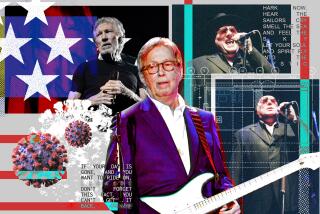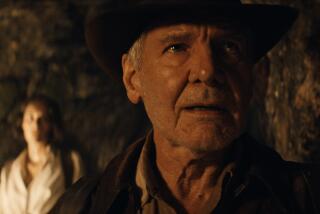Have a Moral Dilemma? Relax, the Ethicist Is In
- Share via
He will not do Oprah. That’s definite.
And he won’t be making any guest appearances on “ER,” “Chicago Hope” or “General Hospital,” although he has given them more than a few story lines.
No, except for that frightening moment in 1994 when he almost telephoned Howard Stern, the world’s most quoted living philosopher will not “entertain.”
For Arthur Leonard Caplan, PhD, the practice of bioethics is no laughing matter. Well, not every day anyway.
That said, he does seem to be having fun these days. Got a slippery moral dilemma? An ethical crisis? Has a woolly white mammal been cloned on a farm outside Edinburgh, Scotland?
Caplan is your man.
It can happen at midnight or noon, on this continent or the next. Any time for Art is a fine time to call. His opinions are yours. All you have to do is ask.
Even in the first hot week of clone fever, when about 10,000 people per day were checking into his University of Pennsylvania Web site (https://www.med.upenn.edu/bioethics) for a look at his special cloning page, Caplan managed to answer more than 300 calls without losing his cool.
As reporters cracked the same lame joke over and over again--”So I bet you wish you could clone yourself about now, huh?”--Caplan gamely went along. “Funny! Really, very funny!”
When the few journalists who hadn’t already memorized it asked Caplan for his home number, he gleefully provided it--and, as a bonus, threw in an itinerary of where he could be reached minute by minute for the next 48 hours.
The result, prefaced with apologies for his “cloned responses,” was an explosion of Caplanisms across the nation’s news pages and airwaves. “The sheep is out of the barn, but it hasn’t hopped over the fence,” he told one science writer.
“We tend to think that the deity is supposed to be engineering the future of the world, not some guys on Scottish sheep farms,” he quipped to another.
In the rarefied atmosphere of abstract moral philosophy, Art Caplan is a breath of fresh air. Or he’s a windbag, depending on your perspective.
As the most popular yet least predictable of the so-called modern ethicists, Caplan is also the fastest-talking commentator in a field famous for its careful deliberations and shortage of easy answers.
Since the birth of modern bioethics 35 years ago, few practitioners have been so high-profile, so aggressive or so self-promoting as the 46-year-old Caplan. Even the scholarly father of bioethics, Daniel Callahan, who hired Caplan to join his bioethics research at the famed Hastings Center in Briarcliff Manor, N.Y., risks being eclipsed by Caplan’s spotlight.
A soft-spoken, quiet scholar, Callahan has criticized his former protege for failing to bring “an Arthur Caplan theory of things” to the ethics discipline. Like Callahan, USC’s renowned bioethicist Alexander M. Capron has said there is danger in becoming “too quotable” and in trying to offer “nuanced understanding” on deadline.
But for this curly haired sage with the physique of a football player, “There is no point in doing bioethics if some of it doesn’t take place in public.” The author of about 20 books, 450 journal articles, and, until recently, a syndicated column, Caplan also is the founding president of the American Bioethics Assn., which is weighing the merits of certifying or standardizing the training of the nation’s growing bioethics profession.
There is no specified background or training for bioethicists. Caplan trained as a philosopher of science at Columbia University and is a professor and director of Penn’s Bioethics Center--for which he receives a handsome, by academic standards, six-figure salary.
While Caplan is the first to agree that there is “no Caplan worldview,” he is famous for opinions on such issues as health care rationing (if it discriminates against the poor, he’s against it), using babies born without brains as organ donors (he’s for it), and legalizing physician-assisted suicide (he’s against it when practiced by any M.D., but especially opposed to Dr. Jack Kevorkian’s undignified method of “carbon monoxide and dripping stuff”).
In the interest of advancing his views, Caplan does not apologize for such habits as calling reporters before they call him, for playing favorites (the New York Times among them), and, worst of all, for speaking and writing so, yes, entertainingly about complex human dramas.
“Hey, this is what philosophy looks like when it’s hands-on,” Caplan counters.
Besides, he says, if he’s become so much of a public figure, “. . . then how come people on the street still mistake me for Joey Buttafuoco?”
(BEGIN TEXT OF INFOBOX / INFOGRAPHIC)
The Quotable Mr. Caplan
Does bioethicist Arthur Caplan really have an opinion on everything? It would certainly seem so. Here’s a sampling.
* On cloning: “America is hyperventilating over cloning. Given the state of today’s cloning technology, comments about clone armies, organ farms, subhuman drones and children miraculously brought back to life are overheated and silly.”
* On Jack “Dr. Death” Kevorkian: “He is a serial mercy killer who is obsessed with death, afraid that it will catch him unawares.”
* On Dr. Ricardo Asch, director of the infamous UC Irvine fertility clinic charged with egg-swapping and embryo thefts: “He is the poster boy for regulation.”
* On the future of genetic engineering: “In a market society, notions of perfection will be sold. You can almost see the shops at the mall: Genes R Us.”
* On his quick-quote style: “I pride myself on not just blasting away at things. One of my rules is to always read the original [research] paper. I am proactive. I want to try to get there early, because I want to have some time to ponder the issues and the responses. Even though it seems like I’m lobbing grenades, I am not.”
* On technology: “Don’t fall for the hype and all those Frankenstein and clone movies. Science and technology don’t have to be our masters. Human beings can control the technologies they invent.”






